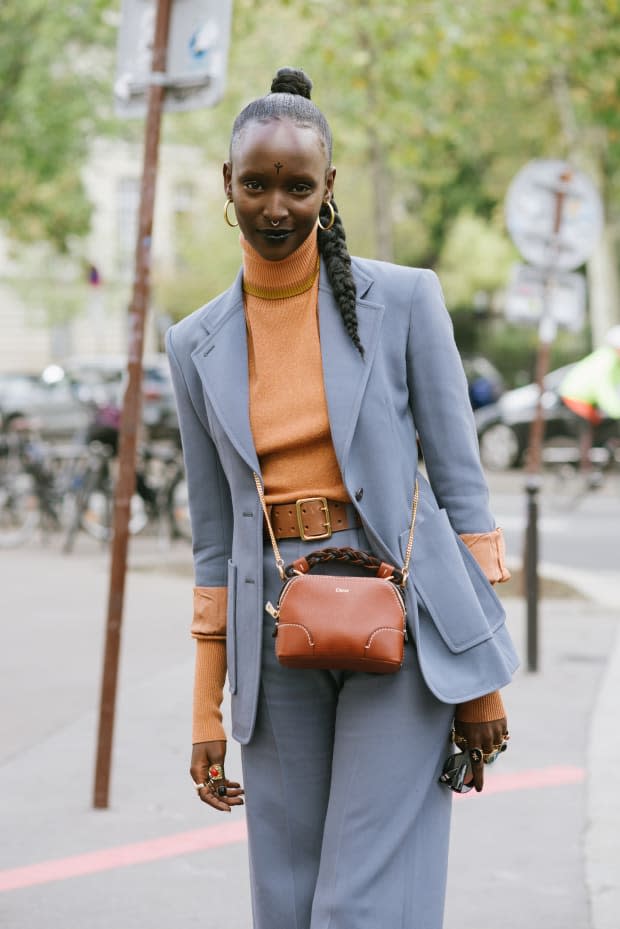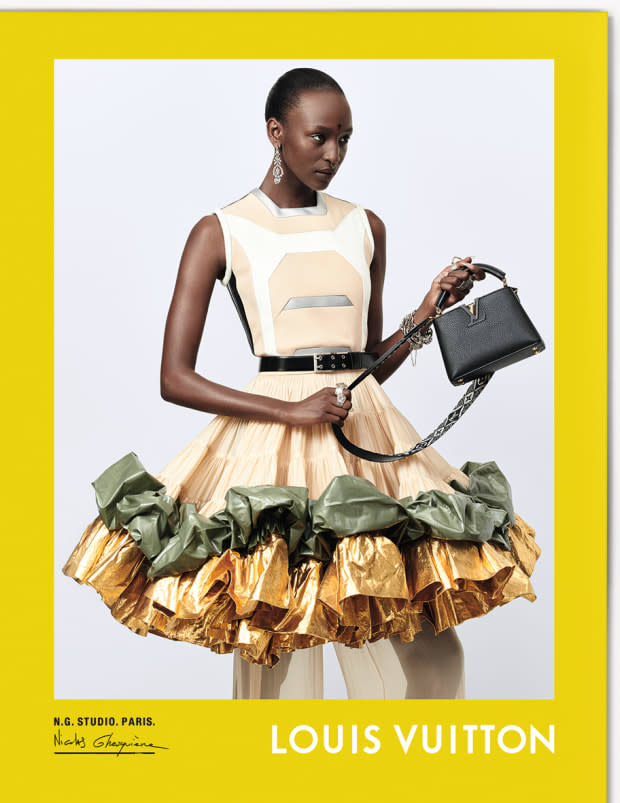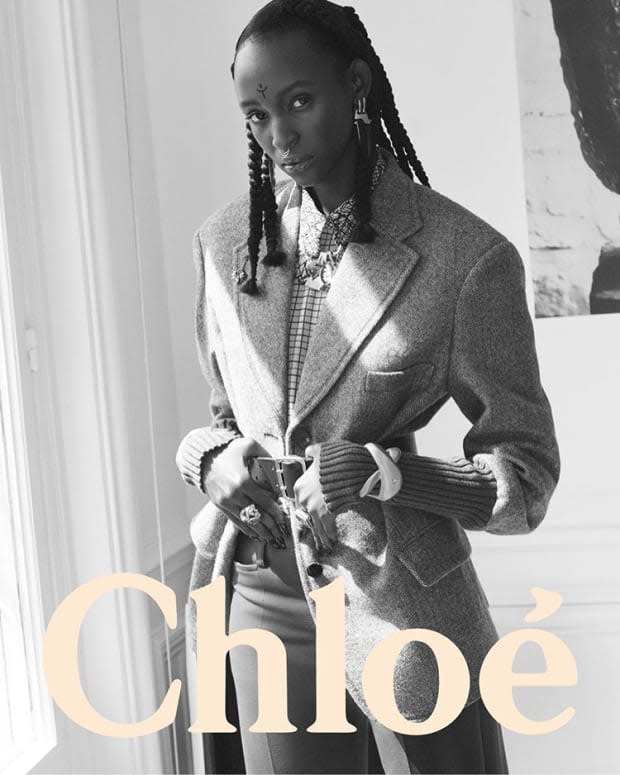How I Shop: Lous and the Yakuza
The singer, rapper and songwriter — as well as Louis Vuitton and Chloé model — uses fashion and beauty to shine a light on her Congolese-Belgian heritage.

We all buy clothes, but no two people shop the same. It can be a social experience, and a deeply personal one; at times, it can be impulsive and entertaining, at others, purpose-driven, a chore. Where do you shop? When do you shop? How do you decide what you need, how much to spend and what's "you"? These are some of the questions we're putting to prominent figures in our column "How I Shop."
Lous and the Yakuza is the best kind of pop star in that, well, she's not really a pop star at all.
The Congolese-Belgian multihyphenate — we're talking singer, rapper and songwriter, not to mention bona fide "It" model — defies genres, with a track catalog that hits trap, R&B and hip-hop influences, and then some. The resulting sound isn't like anything you've (present company included) heard before, with slick, melodic tracks she sings in both French and English. And the numbers don't lie: Her debut single, "Dilemme," has more than 30 million Spotify streams, while its official music video is at 6.2 million views and counting. Her next release, "Tout est Gore" took off in February after Madonna shared a video of her daughters, Stella and Estere, dancing to the song. "I live to see young Black girls being inspired and fierce to my music," Lous responded at the time.
Born Marie Pierra-Kakoma, Lous, now 24, began songwriting as early as six years old, throughout her childhood displacement first to Belgium, then to Rwanda in the midst of the genocide of the Second Congo War, then back to Belgium. While attending a Brussels boarding school in her teen years, Lous started uploading a number of EPs onto SoundCloud under her stage name. "Lous" is "soul" spelled backwards, and "Yakuza," the collective name for her bandmates, serves as a testament to her love of Japanese culture. While it technically translates to "loser," "Yakuza" is more frequently associated with Japan's organized crime syndicates.
Being a self-proclaimed "loser," though, is a label Lous physically wears with pride: She paints what she calls a symbol of acceptance — one she created that's reminiscent of a letter "Y" with a dot in the middle — on her forehead every single day. Fashion-wise (and in collaboration with her stylist, Elena Mottola), Lous can be spotted in labels like Prada, Loewe and Maison Margiela, yet she can carry a fussy Ann Demeulemeester garment with all the ease of a simple T-shirt and well-worn jeans. The industry is smitten: Most recently, she's signed on as a sort of spokesmodel for Louis Vuitton, appearing in the house's Fall 2020 campaign and even closing its Spring 2021 runway show; she's also starred in campaigns for both Chloé and Adidas.
On Friday, Lous finally drops her debut album, "Gore," on which she partnered with Spain's El Guincho, the producer best known for his work on Rosalía's "Malamente." Ahead of the release, I snagged some time with Lous over Zoom, during which she shared her approach to getting dressed, how her global background influences her style to this day and why she's so picky about the brands she wears.

"I come from a very traditional country. In Rwanda, they were judgmental about how you dress. I started my fashion [obsession] in a country where I couldn't even be free, so I had to be very creative. I had a shirt I would cut up. I'll do crazy things to look different because I love to look a little bit different.
"I was in contact with so many different cultures [growing up], and the way they look was very, very different, especially in Rwanda and Congo. They're neighboring countries so you'd think they're similar, but they're not at all. In Congo, they literally created something called [La Sape], which is the art of getting dressed in a very extravagant way. I guess I took more from Congo because it's so extra — I'm Congolese and we love to be extra.
"We suffer from such a big lack of representation because even today, when brands are trying to be diverse, it's still not enough. I'm saying it's not enough. I know it's not easy. It's way easier to say than to actually do it, to make your brand pop when you're from Africa. It's so hard because you don't have the resources. But it's also up to African people to showcase ourselves. That's what I'm trying to do in my videos. I'm trying to incorporate my own people, because who else will? Literally nobody. And I do the same on a daily basis when I get dressed in the morning. I have to look fresh because I do represent my community now, and I don't want us to look like shit. In Africa, there's a thousand, million, billion Black girls, and we don't ever see them. So now I'm that face, especially in Belgium. I carry that weight with me daily, so I always try to look popping.
"Right now, I just got out of the Louis Vuitton show and there was a bunch of my fan base [waiting for me outside] — 20 kids looking so fly. They were like, 'Oh my God, you're so fly!' And I was like, 'You're fly, too!' And we're like, 'Oh my God, we're all fly!' But it feels so great to do that. People connect with you because of the way you present yourself, but if I look crazy and I never sound smart, I'll be a shame to my community. And that's a problem. I want to be an option. I want [young people] to be like, 'It's a possibility I can actually be a female Black entertainer.' I want to be that instrument, but I also don't want to educate people, because that's not my job.
View the original article to see embedded media.
"I just try to make it fun. I try to play with my style. I try to play with my eyebrows now that they're nonexistent. [Laughs] My whole life, I've never suffered from a lack of self-confidence. I was a very confident kid and I'm still very confident. I think that's the one thing that's helped me. Fashion is a very interesting tool when it comes to confidence because the way I feel every morning is going to define how I'm going to dress. Today, for example, I was like, 'I feel chill.' So I'm here wearing sweatpants — still extra, but sweatpants. On the other hand, I might wake up tomorrow and feel like I'm in 'The Matrix,' where I'll be wearing a full black outfit with a long black jacket and I'd be in some kind of superhero fantasy world. Sometimes I feel like shit, but you know what? I dress a certain way so I don't feel like shit. It sounds weird, but it really helps. I'll put a jacket on and people will be like, 'Oh, you look good.' And I'll be like, 'Thank you. I was having a shitty day.' And that's changing the dynamic of my journey.
"I don't shop online at all. I've never shopped online. I'm trying to get on it, but I don't know why I don't trust it. I'm like, 'Is the product going to come the way I see it online?' I'm a complete impulse shopper. I go shopping randomly, once a month, and I'm like, 'Yay. Let's waste all my money.' The last thing I bought was sunglasses, in Greece. I used to do a lot of vintage shopping and I don't anymore. I don't have time, to be honest with you. That's the only reason.
Related Articles:
How I Shop: Ava Max
Samantha Burkhart Is the Woman Behind Music's Most Delightful Capital-F FashionGrace VanderWaal Is a 14-Year-Old Music and Vintage-Shopping Prodigy
"At Louis Vuitton, I kind of know everyone now — the hairdresser, the makeup artist, the designer — and we get along so well. It's like you're home backstage, and you're just going to walk [the runway] for five seconds and then you're back home. You have to be your fiercest. It's very empowering. And [creative director Nicolas Ghesquière] is such a sweetheart. What the hell? If I had his career, I'd probably be a piece of shit. [Laughs] No, I wouldn't.
"[This season,] the models came from literally all around the world. It was crazy. The girl next to me [in the lineup] was from Argentina and it was her first time coming to Europe. I felt super comfortable because that's the image of my whole life, my whole story — living abroad and meeting new cultures.

"The first thing I check [when I decide what brands I want to work with] is whether they're racist or not. It's very sad. But that's the first thing I'm checking — whether the brand is inclusive. I know brands can't be perfectly inclusive, but I'm really like, are they actually open to diversity, open to differences? Are they making choices based on the artistry or the skin color? And then, what is the philosophy of the brand? For example, I love Chloé because [creative director Natacha Ramsay-Levi] is such a powerful woman. She's someone I look up to — she's always caring, always respectful. People have told me so many negative things about the fashion industry and I'm just meeting these amazing artistic minds, so that's not my experience.
"I also pick [brands] based on their philosophy. Do I agree with Louis Vuitton's brand, how they present themselves? Are they something I'm not? Or I check the designer. I'm like, 'Okay, Nicolas, what kind of person is he?' Because there's a lot of designers who have made problematic statements that were very harsh, especially in early 2000, late '90s. Sometimes you have one person who represents the brand and they say some crazy shit, but you have all those 50 people behind the scenes who are just amazing. I try to be as fair as possible because nobody's perfect. I'm not at all.
"We feel quick to cancel things without seeing the actual problems behind them. And I'm not saying there's anything good in [those problems]. But the problems are always way bigger than we see them, and I wish people cared much more about the actual people in every situation. I wish we thought about each person in the supply chain and how to fix everybody's problem. You're not going to change one thing and the whole chain is going to be fixed. So we have to be careful in what we say and the energy we give to the world. Anyway, that was my philosophical moment."
This interview has been edited and condensed for clarity.
Never miss the latest fashion industry news. Sign up for the Fashionista daily newsletter.
